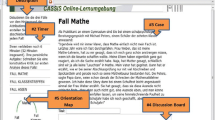
Overview
- Proposes innovative ways of achieving flexible scripting in CSCL and demonstrates the significance of flexible scripting through systematic investigation
- Clarifies the differences between adaptive versus adaptable scripting and addresses their underlying mechanisms
- Equips readers to handle complex CSCL scenarios and to provide an optimal degree of structure for learners
- Includes supplementary material: sn.pub/extras
Part of the book series: Perspectives on Rethinking and Reforming Education (PRRE)
Buy print copy
About this book
In the first empirical study flexibility was accomplished through adaptivity, and through adaptability in the second. The results of these studies show that adaptive and adaptable scripts enhanced the quality of collaborative knowledge construction processes as well as learners’ collaboration skills, compared to inflexible scripts.
The findings presented in this book will contribute to theory building of the scripting approach in CSCL. The authors propose two innovative ways of achieving flexible scripting and address the mechanisms by which adaptive versus adaptable script influences collaborative knowledge construction. Moreover, the adaptive and adaptable scripting approaches provide hands-on examples for practitionersand contribute to their understanding of teaching design in CSCL settings.
Similar content being viewed by others
Keywords
Table of contents (5 chapters)
Authors and Affiliations
About the authors
WANG Xinghua got her Ph.D degree in Educational Psychology at Ludwig Maximiliam University of Munich, Germany; and now is working as an assistant professor in the Faculty of Education at Beijing Normal University, China. Her research focuses on learning in different contexts, especially the authentic assessment of learning processes and outcomes in formal as well as informal setting.
MU Jin received her Ph.D in Educational Psychology at the University of Munich. Her main research area is Computer-Supported Collaborative Learning, specifically the assessment of the collaborative learning processes. She is particularly interested in emerging text classification and data mining technologies that provide novel approaches to analyze discourse data.
Bibliographic Information
Book Title: Flexible Scripting to Facilitate Knowledge Construction in Computer-supported Collaborative Learning
Authors: Xinghua Wang, Jin Mu
Series Title: Perspectives on Rethinking and Reforming Education
DOI: https://doi.org/10.1007/978-981-10-4020-7
Publisher: Springer Singapore
eBook Packages: Education, Education (R0)
Copyright Information: The Editor(s) (if applicable) and The Author(s), under exclusive license to Springer Nature Singapore Pte Ltd. 2017
Hardcover ISBN: 978-981-10-4019-1Published: 05 May 2017
Softcover ISBN: 978-981-13-5026-9Published: 11 December 2018
eBook ISBN: 978-981-10-4020-7Published: 25 April 2017
Series ISSN: 2366-1658
Series E-ISSN: 2366-1666
Edition Number: 1
Number of Pages: VII, 137
Number of Illustrations: 47 b/w illustrations



